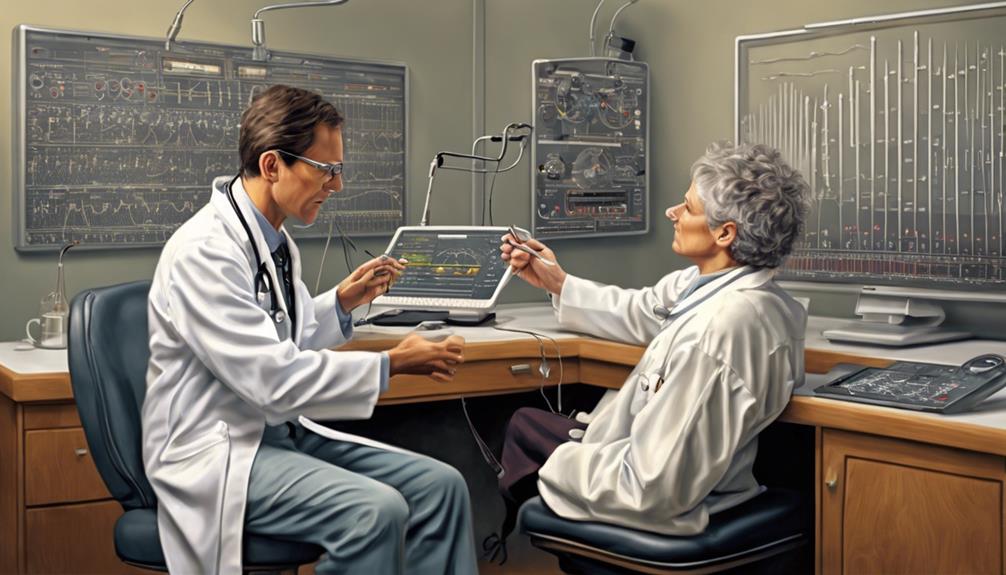A friend recently shared with me that they suffered from sudden hearing loss after attending a loud music event. This made me wonder: what are the key indicators of temporary versus permanent hearing damage?
Understanding the nuances between these two types is essential, as it can impact the necessary steps for treatment and management. As we explore the signs and factors that differentiate temporary from permanent hearing loss, we aim to provide insights that could potentially help individuals navigate this aspect of their health more effectively.
Key Takeaways
- Differentiate between sensorineural and conductive causes for permanent or temporary hearing loss.
- Immediate evaluation is crucial for sudden hearing loss to determine permanency.
- Monitoring symptoms and audiometric tests help distinguish temporary from permanent hearing loss.
- Consult an audiologist for accurate diagnosis and tailored interventions for hearing loss.
Types of Hearing Loss
Exploring the various types of hearing loss provides crucial insights into the diverse mechanisms and conditions that can impact an individual's auditory function.
Sensorineural hearing loss involves damage to the nerves and hair cells responsible for transmitting signals from the inner ear to the brain, leading to difficulties in processing sound.
On the other hand, conductive hearing loss can occur due to obstructions such as ear infections, earwax buildup, or foreign objects in the ear canal, which hinder the conduction of sound waves.
Mixed hearing loss combines aspects of both sensorineural and conductive hearing loss, posing challenges in treatment planning.
Central hearing loss, affecting the central auditory nervous system, disrupts the brain's ability to interpret sound signals correctly.
Sudden hearing loss, characterized by a rapid decline in auditory function, necessitates immediate evaluation and intervention to prevent long-term complications.
Understanding these distinct types of hearing loss is essential in determining appropriate management strategies and providing effective support for individuals experiencing varying degrees of hearing impairment.
Causes of Temporary Hearing Loss

Temporary hearing loss can result from various causes such as ear infections, medications, allergies, loud noise trauma, and obstructions. When individuals experience temporary hearing loss, they may notice symptoms like muffled sounds, difficulty hearing high-pitched noises, balance issues, and tinnitus. This type of hearing loss can occur suddenly or develop over a short period, affecting people of all ages.
To determine the severity and type of temporary hearing loss, evaluation tests such as pure tone audiometry, tuning fork tests, and auditory brain stem response tests are commonly utilized.
The good news is that with appropriate treatment, temporary hearing loss can often be resolved. By addressing the underlying cause, whether it be treating an ear infection, adjusting medications, protecting the ears from loud noises, or removing obstructions, individuals can regain their normal hearing function. Seeking timely evaluation and intervention is crucial in managing temporary hearing loss effectively and preventing it from becoming permanent.
Causes of Permanent Hearing Loss
Permanent hearing loss can be caused by a variety of factors, including prolonged exposure to loud noise, age-related changes in the inner ear, certain health conditions, ototoxic medications, and gradual processes that necessitate early identification for appropriate management.
Prolonged exposure to loud noises can damage the delicate hair cells in the inner ear, leading to irreversible hearing loss. Age-related hearing loss, known as presbycusis, is a common cause of permanent hearing impairment due to natural changes in the inner ear over time. Additionally, certain health conditions such as genetic disorders, autoimmune diseases, Meniere's disease, viral infections, and head trauma can result in permanent hearing loss.
Furthermore, medications with ototoxic effects can contribute to irreversible damage to the hearing mechanism, leading to permanent hearing impairment. Recognizing the signs of these conditions early on is crucial for effective management and intervention to mitigate the progression of permanent hearing loss.
Distinguishing Permanent From Temporary Loss

When differentiating between hearing loss types, understanding the distinction between temporary and permanent conditions is crucial for effective management and intervention. Permanent hearing loss is typically irreversible, necessitating long-term treatment or management strategies.
Conversely, temporary hearing loss may resolve spontaneously or with appropriate treatment, such as addressing underlying causes like ear infections or earwax buildup. Audiological tests play a vital role in determining the type and severity of hearing loss, aiding in the differentiation between temporary and permanent conditions.
Monitoring the duration and progression of hearing loss symptoms can offer valuable insights into whether the loss is temporary or permanent. Seeking prompt evaluation by a healthcare professional is essential as it can lead to an accurate diagnosis and appropriate intervention for either temporary or permanent hearing loss.
Preventing and Treating Hearing Loss
Utilizing protective ear gear in noisy environments can significantly lower the risk of enduring hearing loss. Hearing loss can occur due to various factors, including exposure to loud noises and certain medical conditions. To address hearing loss effectively, it's crucial to take the best course of action promptly.
Here are four essential steps to prevent and treat hearing loss:
- Wear Ear Protection: Invest in quality earplugs or earmuffs to safeguard your hearing in loud settings, such as concerts or construction sites. Prioritizing ear protection can help prevent potential damage to your hearing.
- Seek Immediate Medical Attention: If you experience sudden hearing loss or notice a decline in your hearing abilities, see a doctor right away. Prompt evaluation can determine the causes of temporary hearing issues and guide appropriate treatment.
- Consult an Audiologist: Professional evaluation by an audiologist can accurately diagnose the nature of your hearing loss—whether it's permanent or temporary. They can recommend suitable interventions, such as hearing aids or cochlear implants, tailored to your specific needs.
- Follow Up Regularly: After initiating treatment, maintain regular follow-up appointments to monitor your hearing health. Tracking any changes in your hearing function can help manage hearing loss effectively and adjust interventions as needed.
Frequently Asked Questions
How Long Does It Take for Temporary Hearing Loss to Go Away?
Temporary hearing loss typically resolves in a few hours to a few days, depending on the underlying cause. Seeking prompt medical attention and treatment can help speed up the recovery process.
Monitoring symptoms and consulting a healthcare professional can provide a clearer timeline for the duration of temporary hearing loss. Remember, early intervention is key to addressing temporary hearing loss effectively.
What Is the Difference Between Permanent and Temporary Hearing Loss?
When it comes to hearing loss, understanding the difference between permanent and temporary conditions is crucial. Permanent hearing loss is irreversible and often requires ongoing management, like hearing aids.
Temporary hearing loss, on the other hand, can be resolved with appropriate treatment. Differentiating between the two involves assessing underlying causes and conducting diagnostic tests.
Timely intervention and professional evaluation play a key role in determining the nature of the hearing loss and implementing effective treatment strategies.
Can Hearing Loss Go Away on Its Own?
Absolutely, hearing loss can indeed go away on its own, depending on the underlying cause. Factors like ear infections, earwax buildup, or certain medications can trigger temporary hearing issues that may resolve spontaneously.
It's crucial to monitor symptoms closely and seek professional evaluation to determine the nature of the hearing loss. Quick action and proper care can make all the difference in whether our hearing loss is fleeting or lasting.
How Do You Regain Temporary Hearing Loss?
We can regain temporary hearing loss through various methods, including seeking medical evaluation for proper diagnosis and treatment. Depending on the cause, treatment options like medication for infections, earwax removal, or noise reduction strategies can aid in recovery.
Monitoring symptoms and prompt medical attention are crucial in regaining temporary hearing loss effectively and preventing complications. Professional guidance from an audiologist or ENT specialist can provide tailored solutions for individual cases of temporary hearing loss.
Conclusion
In conclusion, whether our hearing loss is temporary or permanent, seeking help from professionals is key. By understanding the causes, distinguishing between the types, and taking preventative measures, we can better manage our hearing health.
Remember, our ears are precious and deserve the best care possible. Let's listen closely to our bodies and take action when needed to ensure a sound future ahead.









